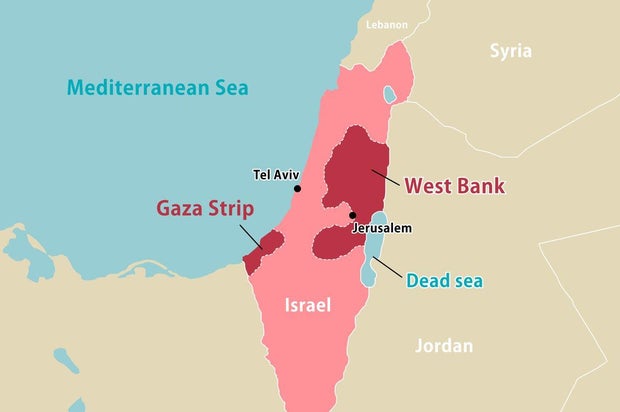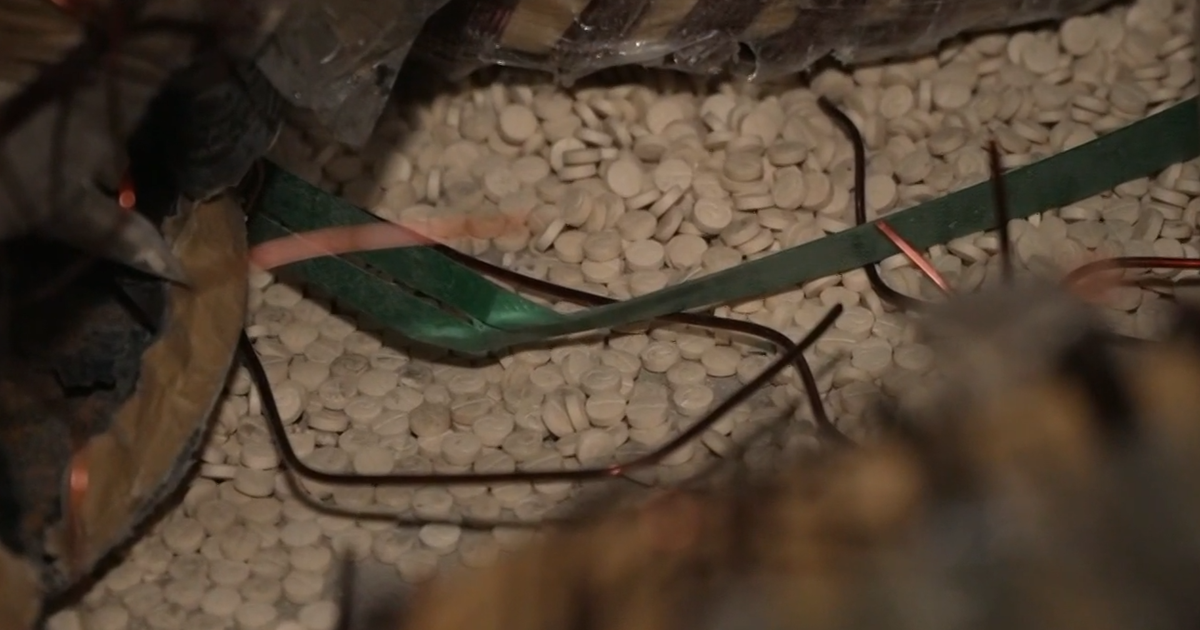CBS News
Hezbollah vows revenge, Israel moves troops to Lebanon border after pagers explode, fueling fear of wider war

The powerful Iran-backed militant group Hezbollah continued to strike what it called military targets in northern Israel Thursday after thousands of its members were injured and several killed in what appeared to be an Israeli operation using exploding pagers and other communication devices. Hezbollah has vowed to retaliate against Israel for the attacks, of which Israeli officials have not publicly claimed responsibility.
Israeli Defense Minister Yoav Gallant did say on Wednesday, however, that his country’s war with Iran’s so-called proxy groups in the region had entered a “new phase,” announcing a shift to the north of Israel after 11 months of intense conflict with Hamas in the Gaza Strip.
“The center of gravity is shifting to the north through the diversion of forces and resources,” Gallant said.
The Israel Defense Forces moved its 98th Division — comprised of several commando brigades — to Israel’s north on Wednesday, a U.S. official and another source familiar told CBS News. The division had been fighting in Gaza.
“We are at the start of a new phase in the war,” Gallant said Wednesday, adding that it would require “courage, determination and perseverance.”
Shortly after Hamas sparked the ongoing war in Gaza with its Oct. 7 attack, its Hezbollah allies began firing rockets and drones at Israel from their strongholds across the border in southern Lebanon. Since then, Hezbollah and the Israeli military have exchanged fire almost daily, forcing tens of thousands of people on both sides of the border to evacuate their homes.
“We all feel suffocated by the situation. We don’t breathe,” Sarit Zehavi, an Israeli researcher focused who worked for 15 years in Israeli military intelligence and lives in northern Israel, told CBS News.
“On October 8th, basically, the war started here, with Hezbollah,” Zehavi said. “Anti-tank missiles and drones through IDF positions at the beginning, but very quickly, it deteriorated to much more than that.”
What is the history of the Israel-Lebanon border?
Israel and Lebanon are divided not by a traditional border, but by a “line of withdrawal” known as the Blue Line, which was established when Israeli forces withdrew from the Hezbollah stronghold of southern Lebanon in 2000. Prior to that, Israel had maintained a “security zone” to prevent attacks from Palestinian groups and Hezbollah on Israeli residents living in the border area.
The Blue Line is recognized by both Lebanon and Israel, and is monitored by the United Nations Interim Force in Lebanon (UNIFIL) and Lebanese troops.
Getty/iStockphoto
When fighting broke out again between Israel and Hezbollah in 2006, a new U.N. Security Council Resolution called for a cessation of hostilities and the withdrawal of Israeli troops once again from Lebanon. It also sought to check the extent of Hezbollah’s power, emphasizing the importance of the Lebanese state exercising “its full sovereignty, so that there will be no weapons without the consent of the Government of Lebanon and no authority other than that of the Government of Lebanon.”
Iran-backed Hezbollah has been able to maintain its power inside Lebanon and build up its arsenal, however, including its stockpiles of rockets, drones and anti-tank missiles.
“The reality is that, prior to October 7th, there was always a vulnerability, but Israel always thought it had been tamed,” Sanam Vakil, director of the Middle East and North Africa Program at the global affairs think tank Chatham House, told CBS News. “What October 7th has done, I think for Israel and Israelis, is reawaken them from, you know, that mirage that they were safe and secure. So going back to October 6th without altering the balance of power on Israel’s borders and within Israel seems hard to do.”
“They are launched against everything,” Zehavi told CBS News of Hezbollah’s attacks on Israel since Oct. 7. “Sometimes it’s tanks, and sometimes it’s homes. Sometimes it’s farmers, and sometimes it’s soldiers, and people are getting killed.”
Tens of thousands of people displaced
Zehavi said around 60,000 Israelis remain displaced from their homes near the Lebanese border amid the ongoing violence since Oct. 7, making “ghost towns” of 43 communities there.
Residents “pretty much left their homes at the beginning of the war because they were afraid of Radwan Brigades, which are the elite unit of Hezbollah, and we were afraid that they will carry out an invasion, just like Hamas,” Zehavi said.
Then there are areas which are slightly further away — between two and six miles from the border — where people are still experiencing Hezbollah attacks but have largely remained in their homes.
“Most of the fire is to the evacuated communities, but I can tell you that… since June, basically about 15% of the attacks coming from Lebanon are to the areas which are not evacuated,” Zehavi said.
She said Hezbollah rockets were relatively easy for Israel’s Iron Dome defense system to shoot down, but the group’s drones are sometimes able to get past aerial defense systems and have killed people. Anti-tank missiles are the most dangerous kind of attack, Zehavi said, because there is no warning and nothing that can be done to defend against them.
“They cannot be intercepted at all. And we don’t have an answer to these. You only have a few seconds. You don’t have alerts. They’re just launched and hit and they’re very accurate because Hezbollah has advanced anti-tank missiles,” Zehavi said.
Zehavi said even if there is a cease-fire reached between Israel and Hamas that brings a cessation of the current hostilities with Hezbollah, too, the threat from the Lebanese group will remain.
“I don’t think that Hezbollah is interested in a wide invasion now, but I think that the basic goal of Hezbollah is to carry out this kind of invasion when it’s most comfortable to them,” Zehavi said.
After Oct. 7, she said Hezbollah “lost the element of surprise, because IDF is prepared here. But imagine that we will have a cease-fire… The people will come back to the communities — they will not be empty anymore, the communities next to the border.”
“If Hezbollah will attack,” she said, “the achievement will be greater, and they will be capable of killing many civilians. IDF cannot draft these reservists [currently guarding the border region] forever.”
“The problem,” said Chatham House’s Vikal, “is that Israel’s leaders aren’t taking the real steps that could alter the balance of power,” pointing to Israel’s ongoing occupation of some Palestinian land and their calls for an independent state as what “gives air and energy to the movement.”
“If [Israel] began to think more concretely about taking air out of the balloon and and addressing their domestic security crisis — not just through military means — but through an accountability governance and peace process, that would be the most disenfranchising way of protecting their security against, you know, a Hamas or Hezbollah or Iran even,” Vikal said.
Israel’s Ambassador to the United Nations, Danny Dannon, asked about a possible escalation along the Israel-Lebanon border, told CBS News in August that “we cannot continue with the situation” with so many Israelis displaced from their homes.
“So either they [Hezbollah fighters] will move from the border, or we will have to move them,” Dannon said.
“All of us feel, all of us share the feeling that we don’t have a prospect,” Zehavi said from her home in northern Israel. “We don’t know where this is heading. There is a very high level of uncertainty. We don’t know whether this is going to develop to a full scale war tomorrow… because none of these problems were solved.”
CBS News
A government shutdown could occur on Dec. 21. Here’s what services and payments could be impacted.

With a federal spending bill now scrapped, the U.S. faces a possible government shutdown that could begin at 12:01 a.m. on Saturday, Dec. 21, when current funding is set to lapse. That raises questions about what types of services and payments could be impacted just days before the holidays.
A looming shutdown stems from controversy over a spending bill that would have extended funding through March 14, but which was nixed by House Speaker Mike Johnson after some Republicans — including President-elect Donald Trump — objected to billions of dollars in spending that had been added to the bill.
Tesla CEO Elon Musk, a billionaire who spent almost $300 million to back Trump and other Republican candidates in the November election, had also voiced opposition to the spending bill, which he called “terrible.” When the measure was scrapped, Musk proclaimed on X, “The voice of the people has triumphed!”
Without congressional approval for new spending, federal agencies are typically barred from doling out money, although there are some exceptions, such as activities to protect life and property. At the same time, agencies must make decisions about which workers will stay on the job, which can lead to varying impacts on government operations.
“Shutdowns can be disruptive, leading to delays in processing applications for passports, small business loans or government benefits,” David Wessel, senior fellow in economic studies at the Brookings Institution, wrote earlier this year in a blog post.
Here’s what could be impacted if the U.S. government shuts down on Dec. 21.
What happens if there is a government shutdown?
If the federal government shuts down, many government workers will be furloughed, although those providing essential services such as law enforcement and air traffic control will continue to report to their jobs.
However, none of those federal workers would get paid until Congress approves a new spending bill. After the shutdown ends, workers will receive retroactive paychecks covering the days they were furloughed or had to work without pay, according to the Office of Personnel Management.
That could create hardships for some government workers, as occurred during a shutdown that stretched for more than 30 days, starting on Dec. 22, 2018. During that stoppage, many federal workers turned to food pantries and other forms of aid to get through the several weeks when they didn’t receive paychecks.
Is Social Security affected by a government shutdown?
The nation’s 67 million Social Security recipients would continue to receive their checks even if the government closes for business. Medicare will also continue to operate, which means seniors covered by the health care plan won’t have their medications or treatments impacted.
That’s because both Social Security and Medicare benefits are authorized by laws that don’t require annual approval.
Even so, Social Security’s administrative budget is discretionary, which means it needs approval from Congress, according to the AARP. As a result, some services offered by the Social Security Administration could be impacted in a shutdown, such as benefit verification and new applications for benefits, the group says.
Would a government shutdown affect the TSA or air travel?
With millions of Americans expected to travel over the holidays, there are plenty of questions about how a shutdown could impact air travel. Because they provide essential services, air traffic controllers and Transportation Security Administration agents would be required to work without pay.
However, there could be “significant delays and longer wait times for travelers at airports across the country, based on what occurred during previous shutdowns,” the Department of Homeland Security warned last year ahead of a potential shutdown.
Does the USPS deliver mail in a government shutdown?
Yes, because the U.S. Postal Service is an independent agency. In previous shutdowns, operations have continued. That means mail would still be delivered, and post offices will remain open.
Does the military get paid in a government shutdown?
Active-duty members of the military and federal law enforcement would continue to work, but would not be paid until Congress signs off on new spending. But most civilian personnel working for the U.S. Department of Defense would be furloughed.
Veterans Affairs and the Defense Department are expected to start alerting workers about shutdown protocols on Thursday, according to the Military Times. The impact would likely be felt in the first week of January when the first military paychecks of 2025 will be deposited, which are scheduled to include a 4.5% pay increase for all troops, the publication noted.
What closes in a government shutdown?
Many services would be put on hold or delayed if there is a shutdown, including environmental and food inspections by the Environmental Protection Agency and the U.S. Food and Drug Administration, according to the Committee for a Responsible Federal Budget, a public policy group that focuses on federal spending.
The national parks would likely close, while the National Institutes of Health could also be impacted, the group noted. While taxes are still due, such as quarterly estimated payments due on Jan. 15, the IRS could also be impacted by furloughs, although tax filing season typically doesn’t kick off until late January.
How long could a government shutdown last?
The odds of a government shutdown have increased with the latest developments, according to Goldman Sachs analysts in a Dec. 18 research note. But, they added, “a protracted shutdown looks unlikely in our view.”
A spending measure also could be passed before the Dec. 21 deadline if Republicans can revise it to appease Trump, who objected to billions of dollars in spending added to the bill, Goldman’s analysts added.
“Trump’s opposition was unrelated to the main components — he stated support for the spending extension, and the disaster and agricultural aid — so it is possible that a revised package could still pass before” the deadline, they wrote.
CBS News
Why the Supreme Court agreed to hear the TikTok ban challenge

Watch CBS News
Be the first to know
Get browser notifications for breaking news, live events, and exclusive reporting.
CBS News
Luigi Mangione headed to New York in latest UnitedHealthcare CEO murder case move

Watch CBS News
Be the first to know
Get browser notifications for breaking news, live events, and exclusive reporting.








